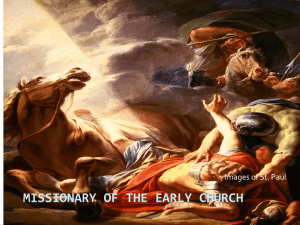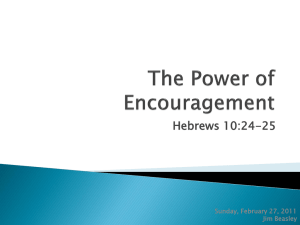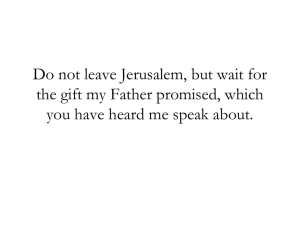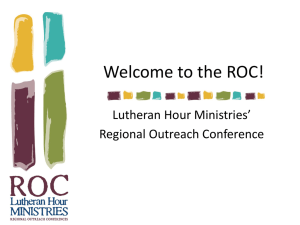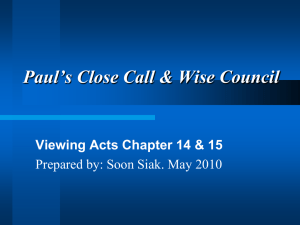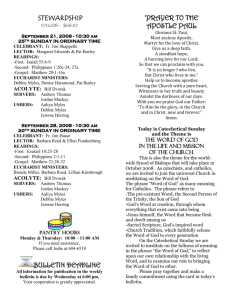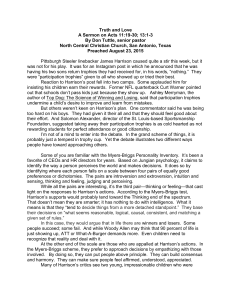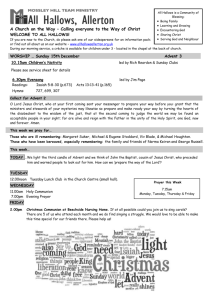Acts 15_2 - Amador Bible Studies
advertisement
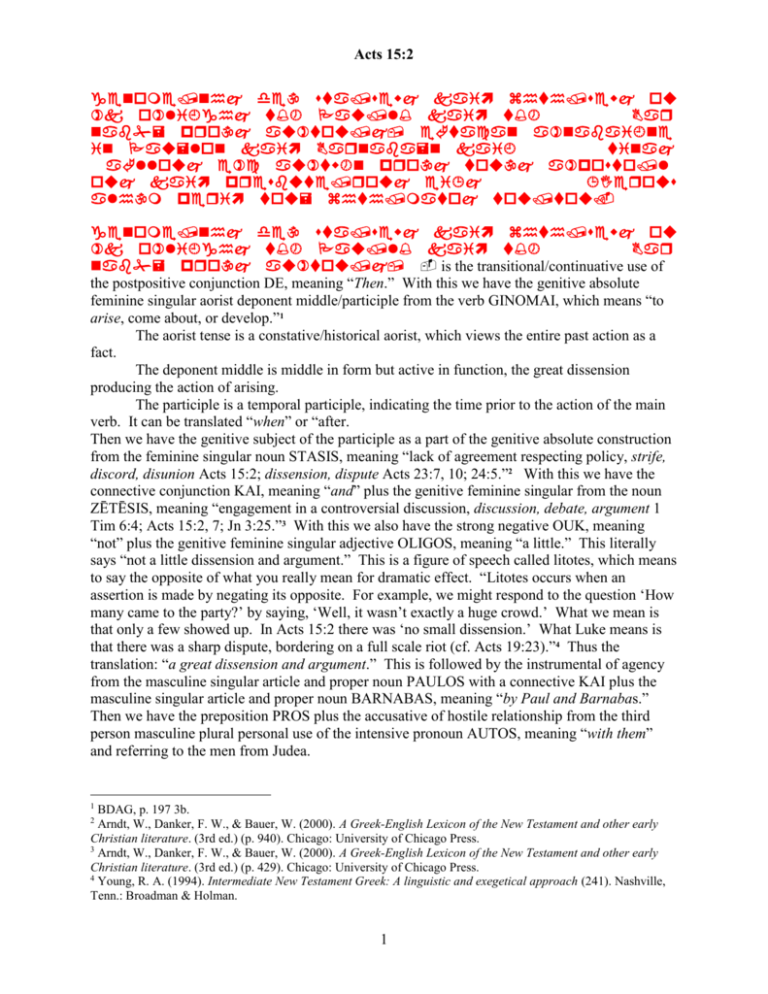
Acts 15:2 is the transitional/continuative use of the postpositive conjunction DE, meaning “Then.” With this we have the genitive absolute feminine singular aorist deponent middle/participle from the verb GINOMAI, which means “to arise, come about, or develop.”1 The aorist tense is a constative/historical aorist, which views the entire past action as a fact. The deponent middle is middle in form but active in function, the great dissension producing the action of arising. The participle is a temporal participle, indicating the time prior to the action of the main verb. It can be translated “when” or “after. Then we have the genitive subject of the participle as a part of the genitive absolute construction from the feminine singular noun STASIS, meaning “lack of agreement respecting policy, strife, discord, disunion Acts 15:2; dissension, dispute Acts 23:7, 10; 24:5.”2 With this we have the connective conjunction KAI, meaning “and” plus the genitive feminine singular from the noun ZĒTĒSIS, meaning “engagement in a controversial discussion, discussion, debate, argument 1 Tim 6:4; Acts 15:2, 7; Jn 3:25.”3 With this we also have the strong negative OUK, meaning “not” plus the genitive feminine singular adjective OLIGOS, meaning “a little.” This literally says “not a little dissension and argument.” This is a figure of speech called litotes, which means to say the opposite of what you really mean for dramatic effect. “Litotes occurs when an assertion is made by negating its opposite. For example, we might respond to the question ‘How many came to the party?’ by saying, ‘Well, it wasn’t exactly a huge crowd.’ What we mean is that only a few showed up. In Acts 15:2 there was ‘no small dissension.’ What Luke means is that there was a sharp dispute, bordering on a full scale riot (cf. Acts 19:23).”4 Thus the translation: “a great dissension and argument.” This is followed by the instrumental of agency from the masculine singular article and proper noun PAULOS with a connective KAI plus the masculine singular article and proper noun BARNABAS, meaning “by Paul and Barnabas.” Then we have the preposition PROS plus the accusative of hostile relationship from the third person masculine plural personal use of the intensive pronoun AUTOS, meaning “with them” and referring to the men from Judea. 1 BDAG, p. 197 3b. Arndt, W., Danker, F. W., & Bauer, W. (2000). A Greek-English Lexicon of the New Testament and other early Christian literature. (3rd ed.) (p. 940). Chicago: University of Chicago Press. 3 Arndt, W., Danker, F. W., & Bauer, W. (2000). A Greek-English Lexicon of the New Testament and other early Christian literature. (3rd ed.) (p. 429). Chicago: University of Chicago Press. 4 Young, R. A. (1994). Intermediate New Testament Greek: A linguistic and exegetical approach (241). Nashville, Tenn.: Broadman & Holman. 2 1 Acts 15:2 “Then when a great dissension and debate arose by Paul and Barnabas with them,” is the third person plural aorist active indicative from the verb TASSW, which means “to give instructions as to what must be done, order, fix, determine, appoint Acts 15:2.”5 The aorist tense is a constative/historical aorist, which views the entire past action as a fact. The active voice indicates that the congregation of Antioch produced the action. The subject of this verb is not stated, but implied by the context. The subject is the congregation in Antioch, specifically the Gentile believers. The indicative mood is declarative for a simple statement of fact and reality. Then we have the present active infinitive from the verb ANABAINW, which means “to go up; ascend.” The present tense is futuristic present, which describes what is about to happen or should now happen. The active voice indicates that the subject of this infinitive (the accusative subject of the infinitive from the names Paul and Barnabas) produces the action. The infinitive is an infinitive of indirect discourse, translated by the word “that…go up.” This is followed by the accusative subject of the infinitive from the masculine singular proper noun PAULOS with a connective conjunction KAI and the accusative masculine singular from the proper noun BARNABAS, meaning “Paul and Barnabas.” Also with this we have the connective KAI, meaning “and” plus the accusative subject of the infinitive from the masculine plural indefinite pronoun TIS plus the adjective ALLOS, meaning “some others.” This is followed by the preposition EK plus the ablative of source from the third person masculine plural personal use of the intensive pronoun AUTOS, meaning “from them.” All of this is the subject of the previous infinitive. “they [the Gentile believers] determined that Paul and Barnabas and some others from them should go up” is the preposition PROS plus the accusative of place from the masculine plural article and noun APOSTOLOS, meaning “to the apostles” with the connective conjunction KAI, meaning “and” plus the accusative of place from the masculine plural adjective PRESBUTEROS, used as a substantive, meaning “elders.” Then we have the preposition EIS plus the accusative of place from the feminine singular proper noun HIEROSOLUMA, meaning “in Jerusalem.” Finally, we have the preposition PERI plus the adverbial genitive of reference from the neuter singular article and noun ZĒTĒMA with the adjectival use of the demonstrative pronoun HOUTOS, meaning “concerning this (controversial) 5 Arndt, W., Danker, F. W., & Bauer, W. (2000). A Greek-English Lexicon of the New Testament and other early Christian literature. (3rd ed.) (p. 991). Chicago: University of Chicago Press. 2 Acts 15:2 question, issue, argument (in our literature it is used only in Acts with the meaning it still has in Modern Greek) Acts 15:2; 26:3; 18:15; 23:29; 25:19.”6 “to the apostles and elders in Jerusalem concerning this issue.” Acts 15:2 corrected translation “Then when a great dissension and debate arose by Paul and Barnabas with them, they [the Gentile believers] determined that Paul and Barnabas and some others from them should go up to the apostles and elders in Jerusalem concerning this issue.” Explanation: 1. “Then when a great dissension and debate arose by Paul and Barnabas with them,” a. The false doctrine of the legalistic Judaizers was immediately challenged by both Paul and Barnabas. These two great missionaries recognized instantly the horrible implications of forcing circumcision upon the Gentile believers. Circumcision would ruin the spread of Christianity in its tracks. This false doctrine could not be tolerated for a moment. b. Philip Schaff describes this “great dissension and debate” as follows: “As regards the question of circumcision and the status of the Gentile Christians, there was a sharp conflict of opinions in open debate, under the very shadow of the inspired apostles. There was strong conviction and feeling on both sides, plausible arguments were urged, charges and countercharges made, invidious inferences drawn, fatal consequences threatened. But the Holy Spirit was also present, as he is with every meeting of disciples who come together in the name of Christ, and overruled the infirmities of human nature which will crop out in every ecclesiastical assembly. The circumcision of Titus, as a test case, was of course strongly demanded by the Pharisaical legalists, but as strongly resisted by Paul, and not enforced. To yield here even for a moment would have been fatal to the cause of Christian liberty, and would have implied a wholesale circumcision of the Gentile converts, which was impossible.”7 (1) Schaff equates the visit to Jerusalem mentioned by Paul in Gal 2:1-5 with the Jerusalem council. Gal 2:1-5, “Then after fourteen years, I again went up to Jerusalem with Barnabas, also taking along Titus. But I went up because of a revelation; and laid before them the gospel which I proclaimed among the Gentiles, but privately to those having a reputation, that perhaps I may be running or might have run in vain. But not even Titus, who was with me, although he was a Greek, was compelled to be circumcised. But because of the secretly brought in false brethren, who snuck in to spy upon our freedom which we have in Christ Jesus, in order that they might enslave us. Not even for an hour did we yield in subordination to them, in order that the reality of the gospel might continue with regard to you.” (2) The problem with equating these two visits is that Paul says in Galatians that he “went up because of a revelation,” whereas in Acts Luke says in our verse that Paul and Barnabas went to Jerusalem because of the determination of the Gentile believers of the church of Antioch. 6 Arndt, W., Danker, F. W., & Bauer, W. (2000). A Greek-English Lexicon of the New Testament and other early Christian literature. (3rd ed.) (p. 428). Chicago: University of Chicago Press. 7 Schaff, P., & Schaff, D. S. (1997). History of the Christian Church. Oak Harbor, WA: Logos Research Systems, Inc. 3 Acts 15:2 (3) It is very possible that both things are true—that Paul was told by God the Holy Spirit to go to Jerusalem and defend the gospel of salvation by grace, and that the Gentile believers of the church of Antioch heartily endorsed this course of action. (4) The other problem with equating these two visits by Paul is the statement by Paul in Galatians that he presented the gospel “privately to those having a reputation,” whereas this council was a very public affair. This can be solved by Paul and Barnabas having a private meeting with Peter and James the Lord’s half brother privately prior to the entire leadership of the church meeting for public discussion. This is a very typical procedure today in large churches, where the pastor and board of deacons will meet privately before an issue is presented to the general congregation. c. Note that Paul and Barnabas initiated this dissension, dispute, discussion, debate, and argumentation. False doctrine must be combated with dissension, dispute, discussion, debate, and argument. There is a right time to stand up and fight for the truth, and this was clearly one of those times. Imagine where we would be if Paul and Barnabas had incorrectly applied Gal 5:19f, (“Now the deeds of the flesh [sin nature] are evident, which are: …argumentation… dissensions,”) at this point. d. Paul gives a further warning about these very believers in Rom 16:17, “Now I urge you, brethren, look out for and avoid those who are causing dissensions and apostasies contrary to the teaching which you have learned. In fact, stay away from them.” 2. “they [the Gentile believers] determined that Paul and Barnabas and some others from them should go up” a. The subject of the verb “they determined” has to be logically inferred from the context. The “they” would certainly not be the Jewish believers of the church of Antioch, because the church was composed mostly of Gentiles. The “they” cannot be considered the leaders of the church, since Paul and Barnabas were the leaders of the church. Therefore, we should assume that it was the congregation in general that determined to send their leaders (Paul and Barnabas) to the church of Jerusalem to settle the issue. b. The mention of Paul first again indicates Paul’s leadership in this cause. c. The “some others” may have included Titus (as mentioned in Gal 2) as a convert from Asia or Cyprus, Timothy as a convert from Lystra or Derbe, and a few of the deacons of the church of Antioch. To be sure, these “others” would be Gentile believers in contrast to Paul and Barnabas, who had both come from a Jewish background. It is possible that John Mark went along as well, since his mother lived in Jerusalem. d. The church of Antioch supported this trip just as it had supported the previous missionary trip of Paul and Barnabas. 3. “to the apostles and elders in Jerusalem concerning this issue.” a. The people who were going to decide this issue in the church of Jerusalem are now emphasized by Luke. The apostles refer to at least Peter and James the Lord’s half brother, if not all the rest of the apostles as well. The elders refer to the pastors of all the Christian assemblies in the city of Jerusalem. 4 Acts 15:2 b. “That the Antiochene church was willing to consult the mother church indicates that they were not at all persuaded that the emissaries represented the majority opinion of the Jewish church.”8 c. The issue is whether or not salvation comes by faith alone in Christ alone or whether circumcision must be added to it. 8 Bromiley, G. W. (2001, c1979-1988). The International Standard Bible Encyclopedia (1:201). Grand Rapids: Wm. B. Eerdmans. 5
